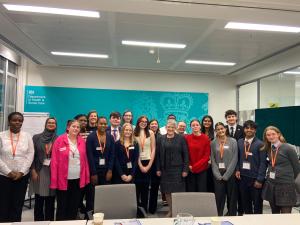The government is currently consulting on the NHS 10-Year Plan, which will set the course for our health service over the next decade. It is critical that children and young people are not left out of this national conversation, so I was delighted that some of my Young Ambassadors and members of my newly formed Special Educational Needs and Disabilities (SEND) Panel were able to join me for a roundtable with the Minister for Public Health and Prevention, Ashley Dalton MP.
As Children’s Commissioner, I welcome the government’s ambition to make this generation of children the healthiest yet – and the 10-Year Plan will be instrumental in achieving this. I want every child to have what they need for healthy childhoods to set them up for long, happy and healthy adult lives.
There’s been remarkable progress on children’s health over the years: medical breakthroughs, coupled with policy and cultural shifts have made growing up in this country safer. Sadly, much of this good work has stalled recently, or even been reversed.
The young people who joined me for the roundtable last week spoke about their experiences and the way children are getting sicker: from the impact of poverty, crime, and the pandemic on their mental health, to children becoming more fearful of vaccinations because of online misinformation, to the difficulty of accessing healthy meals and fun physical activities – reflected in rising numbers of children living with obesity.
It was concerning to hear from children that the services they need are often not able to meet demand. They spoke about the long waits they had experienced across the health system in A&E, mental health services, GPs, gynaecology, neurodevelopmental assessments, dentistry, and cancer screenings. One young person even shared how they faced a 15 hour wait in A&E, and the stress they and their family experienced as a result.
Some disabled young people and neurodivergent children shared their experience of inaccessible services – be that health services, social care, or school – which is all the more concerning given this year will mark 15 years of the Equality Act.
These are not just public health concerns but a failure to uphold children’s rights. Many illnesses are preventable with the right early support from health services, social care, and schools. For conditions that are not preventable, we need to put in the right, early wraparound support so that children can flourish.
As the government develops its 10-Year Plan, there is a huge opportunity to transform children’s health and wellbeing. While factors influencing children’s health go beyond healthcare, this NHS strategy will be pivotal.
Children’s health and wellbeing must be prioritised and sufficiently funded. Children represent 24% of the population, but account for only 11% of NHS expenditure. On a national level, I want to see a Joint Outcomes Framework that aligns public services to improve children’s health, supported by pooled funding and better local accountability. Improved data sharing is essential, and I have long called for a unique identifier for children that prevents them from falling through the gaps in different services, so I am pleased that this will be introduced through the Children’s Wellbeing and Schools Bill. The challenge now is to implement it well, with sufficient infrastructure and technology behind it.
We also need to explore where and how children who need additional support receive it, because they have told me they want it all in one place: whether in their school, community, or homes. My vision is for schools to serve as hubs for wraparound services, with adequate mental health support and the reintroduction of a school nurse in every school. These professionals are uniquely positioned in joining the dots in children’s lives and provide advice to both teachers and pupils. Young people at the roundtable echoed what I hear from children across the country: Relationship, Sex and Health Education is not being sufficiently prioritised or taught well.
One young person suggested a school nurse in every school to help give children regular checks: “Development checks in schools which continue to adolescence. Nurses should feed data back to GPs and doctors, so referrals can happen faster.”
Others wanted “more access to basic health education, like hygiene, how to keep clean on your period”.
The government’s 10-Year Plan is a chance to reshape the landscape of children’s health and wellbeing in a way that reflects their own experiences. I want to thank my brilliant Young Ambassadors and SEND panellists who travelled from all over the country to share their ideas for change. They have pinpointed many of the issues that we know are systemic – echoing the voices of the one million children I have heard from since coming into post.
Now it’s time for action. As one of my brilliant Ambassadors reflected as the session closed: “it’s one thing to be listened to, but action matters.”




